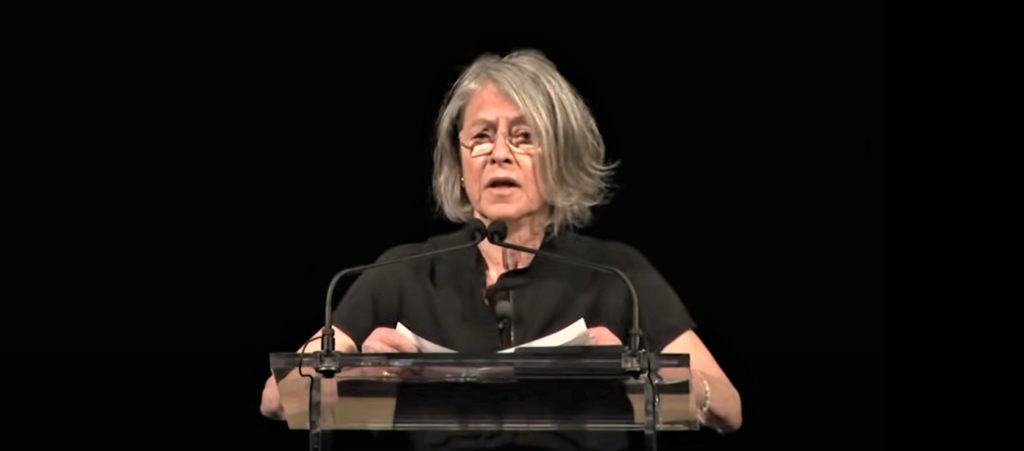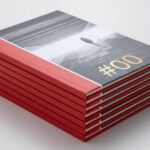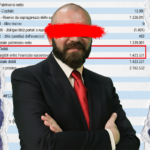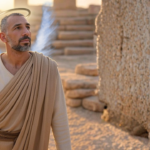There’s a mysterious and silent kinda energy that flows through the verses of Louise Gluck’s poetry : a “Vital force” full of joy and smiles for the past, for the present and for the oncoming future, where woman and artist are yoked and live in a strict connection and sinergy with nature and the whole universe, phisical and spiritual.
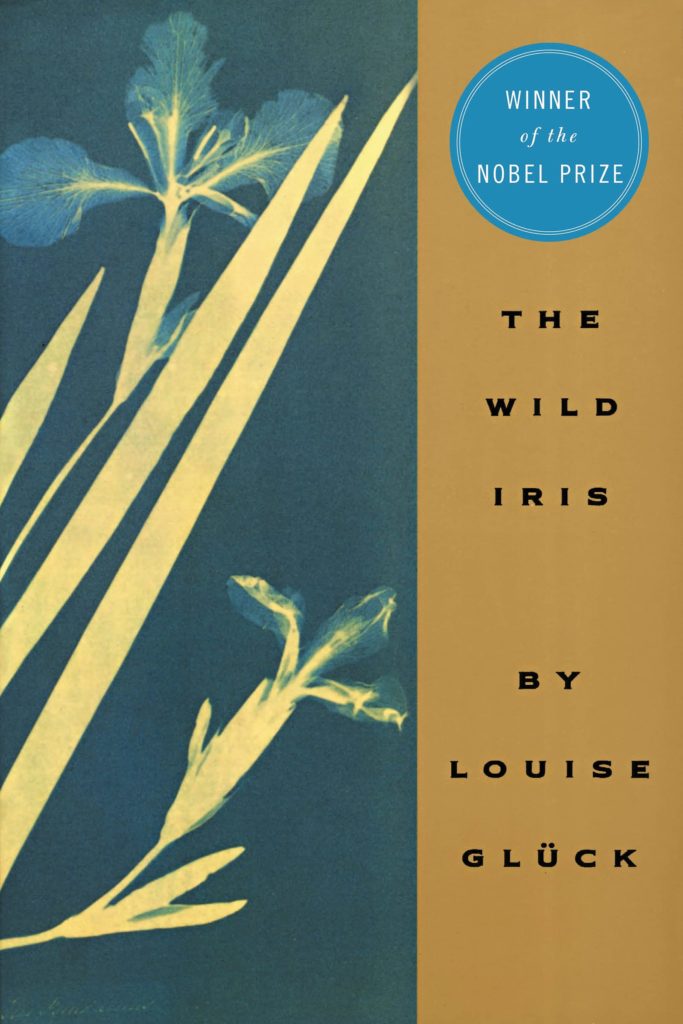
The incipit of the first poem of the sillogy is a small taste of these considerations, sprung from a deep reading, completely immersed in the hidden meaning of the poetic word.
Old, but surprisingly new, Gluck’s verses represent the apex of simplicity, digging a groove in which every minute seed can be sown and immediately become a gigantic wonderful plant with plenty of various and delicate fruits good to harvest, to eat, to digest.
No language affectation, but rare presence of metaphors, the precious lexical choice and all the original syntactic combinations, create a natural field of innocence, where the primordial sin of experience, ends its journey, so as not to start again elsewhere, but to disappear forever.
Louise Gluck, lives and thinks as if she were in a permanent garden, in a fantastic and real garden, perhaps the same garden where Emily Dickinson dreamt to dream dreams, to fly “On the viewless wings of Poesy”.
Nostalgia for Eden, for clear pure waters, for blue skies, for green mountains and for virginal rainbows, appeared to give hope, continue to remind us, the eternal covenant between men and God, so that, peace and respect, may return on this planet, and a “wild iris” will keep on shining into the coloured, sacred and magnificent scenary of creation
” At the end of my suffering
there was a door.
Hear me out: that which you call death
I remember:
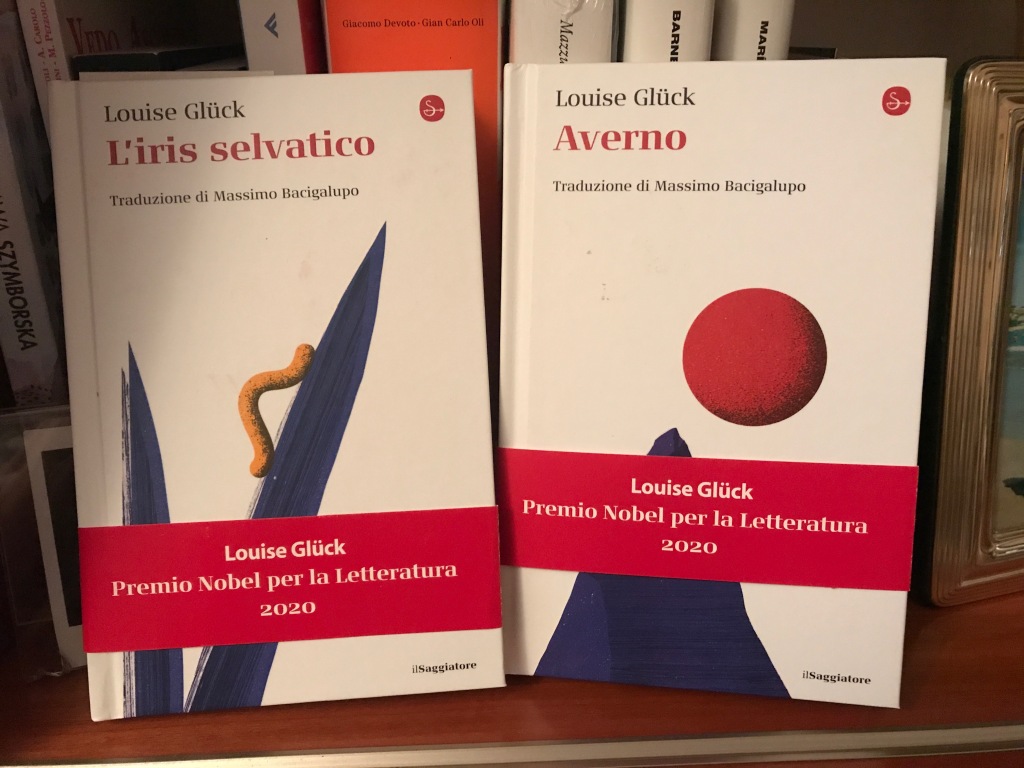
overhead, noises of the pine shifting.
Then nothing. The weack sun
flickered over the dry surface.
It is Terrible to survive
as consciousness
Buried in the dark earth. ” ( Page 12)
The word ” Iris”, In fact, comes from the ancient greek and stands for ” Rainbow”.
” The wild iris” is the first poem, that gives the title to this singular poetical collection, whose natural purpose is the opening of a
” door”, of “That Door” , suspended between heaven and earth, momentarely separating our live from the divine one.
” Garden”, is the most present lexeme, in these poems, a family garden, in the “Green mountains state”, Vermont, USA, a limited space, where mind and body can find a little, real rest, out of the city traffic and the noisy crowds, symbolizing in the same way, the uge, the greatest heavenly garden and its loss, here on the earth: the Garden of Eden.
” go ahead: say what you are thinking. The garden
Is not the real world. Machines
are the real world. Say frankly what any fool
could read in your face: it makes sense
to avoid us, to resist
nostalgia. ( Page 104)
Louise Gluck’s writing, is certainly imfluenced by the biblical lesson, whose wisdom is sculptured, not only on the rock, but, first of all in the heart, maybe in her heart.
Reading her book, we enter a magical natural world, we enter a time that does not belong to our present age.
A dive in the empty space and time of the origins, both endless!
In her pages, inspired by the wise holy scriptures, her dialogue with God is very personal, direct and sincere, breaking out, all the rituals of her religion and others.
She always looks for truth, discovering truth and beauty every time everywhere, into the picture and the synphony of nature…
It would seem that:
” The weight of the world is love,
under the burden of solitude,
under the burden of dissactisfaction,
the weight, the weight we carry is love. ” Who can deny?“,
as the greatest poet of the Beat Generation, Allen Ginsberg, wrote in his famous poem titled “Song”, long ago.
Her florilegium, her gathering flowers, her empathy, her voice that speaks in the name
of plants, streams, colors and grasses, is the typical voice full of respect and love for environment and its miraculous epiphanies.”
The poetess of Vermont, lives her life surrounded by sweet smells and deep sensations, from which she takes her energy, her ” Vital Force” , necessary to speak to herself, to men, to God.
“ When I woke up I was in a forest. The dark
seemed natural.The sky through the pine trees
thick with nay lights.
I knew nothing, I could do nothing but see.
And as I watched, all the lights 9f hraven
fade to make a single thing, a fire
burning through the cool firs.
Then it wasn’t possible any longer
to stare at heaven and not be destroyed.
( PAG. 20)
The moon, the sun, the stars, above, the rivers, the plants, the mountains, the prairies, below, play an important role in her journey among the wonders of the universe and everything shines, because is alive, because God is alive, is a living God and before these miracles her praises for the creator are daily, great and perpetual.
… by the way, see psalm 8, by king David.
The language of the poems of” The wild iris”, is very concrete, what the biblical ebrew language was like : in few words, a language near the nature of things, able to describe their secret, to reveal, “De rerum natura”.
A bucolic world, a modern Arcady, a mental and phisical return to the primordial broth.
American literature, especially poetry, starting from Walt Whitman , to the Beat generation: Ginsberg, Kerouac and others, always sang the vast spaces, the long uge distances, the big green prairies, symbols of freedom, with a strong sense of patriotism, of belonging to a great nation,a homeland, while the gentle sex, the poetessess loved singing their inner life, their small spaces, their gardens : Dickinson, Anne sexton, Sylvia Plat… our poetess of Vermont…
Louise Gluck has a surprising spirituality: there is no presence of Intermediaries between her and God, but a direct contact, a very spontaneous and sincere dialogue, because she speaks freely, without filters, to the Almighty, to the Most High, to the Ancient of days, to the Creator, asking him to intervene in human affairs, calling him amicably, in a christian way.
“Unreachable father, when we were first
exiled from heaven, you made
a replica, a place in one sense
different from heaven, being
designed to teach a lesson: otherwise
the same–beauty on either side, beauty
without alternative–Except
we didn’t know what was the lesson. Left alone,
we exhausted each other.”
(Page 18)
” The wild iris”, is a concentration of reality, hard reality, but this visible unavoidable reality, is a strong, permanent “Ubi consistam”, necessary to go, to disregard the matter and go beyond, toward the metaphysical spheres, where the naked and noble truth conceives its own beauty like a gift to be given to all, to be spread throughout the universe.
Plants, flowers, streams, all natural epiphanies talk. It seems to be in the garden of love, ” in a pine wood”, where the Italian poet Gabriele D’Annunzio, found himself and imagined the presence of God in every breath, everywhere, the so called, famous “Panismo d’annunziano”, expressed in the famous lyric, “La pioggia nel Pineto”, involving all five human senses and the divine scent, where Ermione, hidden among the leaves could show her beauty and give her love to the survived humanity: a new imperfect – perfect Eve.
( See Psalm 23.by King David)
Perhaps the poetess would like her husband and son, to become Adam and Abel still abiding in Eden, even knowing, unfortunately, that the original paradise was lost.
Louise Gluck has the privilege of seeing all things in the way they are and she feels that a new world will come, a new garden will be restored: a fresh return to the hot comfortable womb.
But…lasciare questo mondo per il mondo non visto… cui prodest?
“Trapped in the earth,
Wouldn’t you too want to go
to heaven? I live
in a lady’s garden. Forgive me, lady,
longing has taken my grace. I am
not what you wanted.”
( Page 64)
Louise Gluck likes to see, to touch! She does not believe if she doesn’t see and touch, but her imagination flies high in the azul sky, to create other spaces, where mind and body can have a rest after the hard work of living.
God, her personal God is not visible, but she wants to meet him dispite the human condition, full o sorrows, finitude, dissatisfaction and imperfections and she would do everything but connect her life to the spirit.
She is astonished by the same flame, that allured Moses while he was grazing the flock, in the desert of Madian, under Mount Sinai.
” Even as you appeared to Moses, because
I need you, you appear to me, not
often, however. I live essentially
In darkness.You are perhaps training me to be
responsive to the slightest
brightening. Or, like the poets,
are you stimulated by despair, does grief
move you to reveal your nature? “
(page 112)
Louise Gluck Is aware that as far as she can live in the secret and inner calm of her garden, the dangerous storm Is outside and the battle between good and evil keeps going on, usque ad finem, because of the presence of a wild beast whose name is Satan, who daily acts in our minds to destroy life and joy of living.
Even Siddhartha Gautama, closed in his castle, thought that the world was his world, without sorrows, solitude, poverty, exploitation, old age and death, but once out of the castle he soon realized that the real world, was full of sufferings and so his search for truth began.
Cosa possiamo cambiare, quando non possiamo cambiare niente?
Mutatis mutandis”, “Nosce te ipsum”, dicevano gli antichi latini.
That means that we can do something to change our life, but life is not ours. Nothing belongs entirely to us.
E’ TUTTO SCRITTO?
” Something
comes into the world unwelcome
Calling disorder, disorder-
If you hate me so much
don’t bother to give me
a name: do you need
one more slur
in your language, another
way to blame
one tribe for everithing-
as we both know,
if you worship
one God, you only need
one enemy–
I’m not the enemy. ” ( Page 60)
Poetry is more realistic than fable and history. with only one verse, it can express a long tale.
Louise Gluck onws this capability. She is able to synthesize a lot of sensations, things, deep feelings, in the same way, in unison, highlighting reality and fantasy in an instant.
Her simplicity and clarity are a grace of God!
When she writes, she is guided by a good spirit full of “Life Force”, everywhere, every time.
A kind of Thomasian awareness:
“The force that through the green fuse, drives the flower, drives my green age,
that blasts the roots of the trees
is my destroyer,
and I’m dumb to tell the crooked rose
my youth is bent by the same
Wintry fever.”
The whole material world is transient and also whatever belongs to it.
Nothing will last forever, except God and if God is a living God, nothing will die around him, but there is only a continuous transformation.
Is Entelechy realizable, in our existence?
A simple thing is certain! We came here, to learn, to experience, to understand why we are here, what we must do, and what concerns our eschatological destination.
The poetess of Vermont knows and feels, under her skin, this finitude.
She would like to go out of this mortal-immortal cycle, because, observing life in her garden, she can learn how everything, every living thing is destined to transform Itself and then, disappear, so she tries to embody all around her, to keep inside the passing things , in a spiritual eternal breath.
” I gathered you together,
I can dispense with you-
I’m tired of you, chaos
of the living world-
I can only extend myself
for so long to a living thing.
( Page 150)
As long as, the wind blows on the green grass, the rain falls on the fields and the sun shines high in the azul sky, this kind of life will last, but it would be a mistake, to take everything for granted, everything could change in a moment.
There are not other human beings, except her husband and her son.
No crowd crowds the small garden, but all around there is something invisible, a hidden breath on everything in the magical atmospeare.
With a Little imagination we can hear the sound of the rivers, Pison, Iddechel, Ghion and Eufrate flowing through the Valley of Avila.
The permanent scent of the wonderful flowers will continue to flow through Louise Gluck’s nostrils and the daily miracle, the noumenon will be a daily epiphany, an ordinary phenomenon.
” As a man and woman make
a garden between them like
a bed of stars, here
they linger in the summer evening
and the evening turns
cold with their terror: it
could all end, it is capable
of devastation.”
(page 156)
Love for nature, for her family, for God, is the” Vital force”, tha gives the righteous energy to face days and nites, weeks and months, years past and years to come, in the sunsets and dawns, because life is life and death is just an absence of life.
So, let’s wake up, the world unseen is waiting for us, is preparing our enduring Happiness!
” Hush, beloved. It doesn’t matter to me
how many summers I live to return:
this one summer we have entered eternity.
I felt your two hands
bury me to release its splendor.” ( Page 156)
Scritto a Roma, 15 Ottobre 2021 Venerdi, ore 18 Isola pedonale di Via Flavio Stilicone Cinecittà



